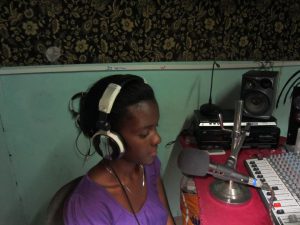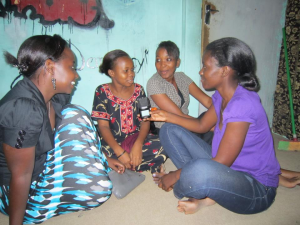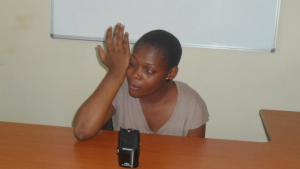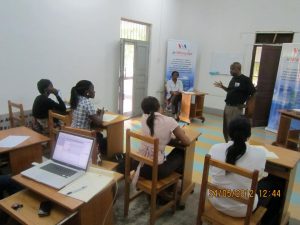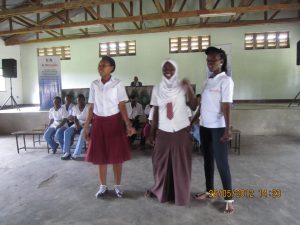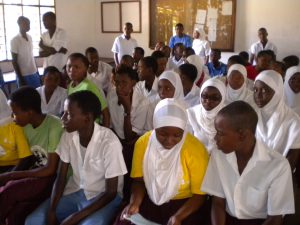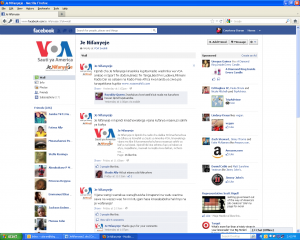Tanzania health project – “Je Nifanyeje” (What shall I Do?)
Je Nifanyeje is part of the Tanzania Health Project which is funded by USAID Tanzania and supported by VOA Swahili. Je Nifanyeje’s mission is to help the youth make informed and important decisions to improve their social and physical health. In English, “Je Nifanyeje” means, “What shall I do.” This thirty minute radio program teaches its young audience, particularly females, how to live healthy lives while gaining the confidence to assert themselves when making difficult decisions. This program distinguishes itself from other programs by explaining strategies for young women to develop the metal capacity and toughness to handle a variety of issues.
Je Nifanyeje focuses primarily on women because the culture forces them to be less assertive, and they are not empowered to become agents of change. These social norms prevent young girls from learning skills to protect themselves from risky social behaviors. This program gives the opportunity for women’s voices to be heard.
One example is communicating about birth control. Many sexually active girls know that condoms offer protection from sexually transmitted diseases and unplanned pregnancy. However, many are inhibited and unable to speak to their partner about their concerns. Through these programs, young women develop effective communication skills for speaking with their partner about using birth control.
Je Nifanyeje is broadcasted on two broadcasting affiliates, RFA Tanzania and Radio Mlimani. It is also played on non-affiliate stations Breeze FM in Eastern Tanzania, Sportstroke ABM-FM in central Tanzania, and Best FM in southern Tanzania. Je Nifanyeje is also accessible online through http://www.voanews.com/swahili/news/crossroads/.
The radio program is split into four segments; health news, a panel discussion, a drama, and a personal story shared by a young girl. The health news segment presents new information, health risks and scientific discoveries the most relevant to the region.
The panel discussion begins with 4-5 stringers discussing current social issues and the resulting health consequences. These stringers are young female citizen journalists between the ages of 21-30. The group’s dialogue revolves around how these issues impact the community, the girls’ personal experiences on these issues, how to make appropriate decisions, and the resulting consequences.
One panel discussion focused on how the lack of school buses forces students to take city buses to school. This creates an opportunity for older men in the community target young girls by offering rides and subsequently taking advantage of them. This situation often leads to trans-generational intercourse, early marriage and unplanned pregnancy. Girls who become pregnant before their bodies have fully matured often develop a severe medical condition known as an obstetric fistula.
After the stringers discuss the issues, the show brings on an expert opinion (doctor, social worker, etc…) to highlight facts. In the second part of this segment, “Ask the doctor,” the stringers have a special opportunity to speak with a professional, and ask questions that benefit them and their audience. This dialogue is extremely candid, ensuring the listeners understand the full context, risks, and potential consequences of the issues.
The next segment is a radio drama. Many of the programs listeners can relate and benefit from the stories told in this segment. The piece demonstrates how to handle the situation to produce a positive outcome.
One show presented a mother who stubbornly chose not to provide mosquito nets to protect her children from malaria, even though her daughter knew where to get them for free, locally. In the drama, the young girl explained the importance of the nets to her mother and convinced her to provide them for the family.
The final segment is called “One Girl’s Story”. During this segment, a young girl offers a personal account of a significant experience that has impacted her life. Their stories are used to emotionally engage the listeners; the young female audience can relate and learn from the painful and uplifting stories that inspire perseverance and strength.
“Kila mtu ana hadithi yake”- Everyone has their own story.
This quote was taken from Mwamoyo Hamza, Chief of the Swahili Service at VOA. Mwamoyo believes the concrete, and sometimes harsh, reality of these stories is essential to the show and its listeners. By embracing the lives of the young women impacted by and relate to the issues the discussed on the show, Je Nifanyeje recognizes that everyone has their own story and seeks to provide them a way to share it for themselves and for the community.
The funding for these programs provides recording equipment needed to produce the show, laptops to prepare and transmit the show, and wide internet access in order for the stringers to research stories and issues. The stringers are trained how to effectively report health and social issues, in addition to the technical training they receive necessary to operate the equipment.
Local town hall meetings are another major initiative of this health project in Tanzania. Town hall meetings serve as another outlet for community members to voice their opinions, learn new information, and connect. During these meetings teens come together to discuss the social and health issues that affect their communities. These issues are similar to those discussed on the radio program. There have been two town hall meetings so far and plans to host eight by the end of FY2012.
The first town hall meeting took place May 18th in Dar es Salaam. This launch served to outline the priorities and goals for the town hall meetings. One hundred-fifty people came to the event to discuss health and social issues and solutions for the community.
The second town meeting was held May 24that a high school in Bagamoyo. Approximately one hundred high school and secondary school students attended the event. The meeting focused on early marriage. This topic has significant health consequences and is extremely prevalent amongst teens 13-18 years old. Although many of the issues the students discuss are geared toward helping young women, teen boys seek the benefits of attending the meetings, too.
Two more town hall meetings have been scheduled for July 10th and 13th. Attendance is expected to be even higher for these events.
Since January 25th, 2012, Je Nifanyeje has been broadcasting on various radio stations throughout Tanzania. The show’s two affiliates, RFA Tanzania and Radio Mlimani, air a live new show during the weekend, with repeated broadcasts during the week. Anyone with internet connectivity can also stream the show through the program’s website. The show has an active Facebook page which has received extensive positive feedback from listeners and even messages from people in other countries asking for similar programs to air in their country.
Data collection on the popularity and number of program listeners is in progress. It has only been six months since the show aired, but quantitative and qualitative audience research on the program’s impact will begin soon. This highlights BBG’s new partnership with Gallup. BBG plans to utilize this industry leading research organization to better serve their audiences and U.S. foreign policy goals.
In the future, Je Nifanyeje directors hope to use SMS texting to attract greater audiences for the town hall meetings and the radio show. They would also like to film the One Girl’s Story segments to develop a documentary for the audience to feel a deeper sense of connection to the young women telling their stories.
The Swahili service is exploring the opportunity of using marketing and promotional tools to increase audience interest, perhaps a concert or football game, and promoting the affiliations between local radio and VOA. They also hope to provide mobile devices to enable stingers to create programs on the spot to reach rural areas and hard to reach audiences.

